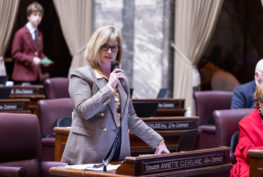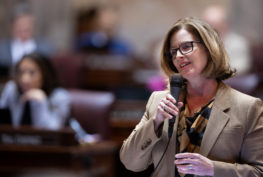OLYMPIA — Legislation passed unanimously today by the Senate directs the state Department of Labor & Industries to adopt rules to accommodate workers at construction sites who menstruate or need to express milk.
HB 2266, the bill passed today, is the companion to SB 6107, sponsored by Sen. Annette Cleveland (D-Vancouver), who said the bill reflects workplace needs she experienced personally.
“When I was a new mom, I returned to work after my daughter was born and I struggled to find a safe, sanitary place to express milk,” Cleveland said. “I recall trying to express milk in my car in a busy parking lot while feeling distressed and stressed and very alone. This is a memory I will never forget.”
While many workplaces have adopted more supportive policies over the years, providing accommodations remains a challenge for certain professions, including the building trades, Cleveland said.
“More and more women are filling jobs in what has historically been a male-dominated industry, but there are still obstacles that discourage women who might otherwise pursue a career in construction,” Cleveland said. “Addressing these basic needs will remove a deterrent for many would-be applicants who could provide skills and training in high demand in construction.”
The bill was modified on the Senate floor to give the Department of Labor and Industries flexibility in setting minimum accommodation standards that are appropriate for jobs sites of different sizes. The bill now goes back to the House for a vote on the Senate changes before it can be sent to Gov. Jay Inslee to be signed into law.
The safety and health standards adopted by the department must include:
- a minimum size bathroom, accessible on the jobsite, that is equivalent to a standard sized portable chemical toilet, or access to a permanent structure with a bathroom, with an internal latch to prevent inadvertent entry;
- adequate time to accommodate for multiple layers of clothing while using the bathroom; and
- an adequate and convenient supply of menstrual hygiene products available at no cost to the workers. Menstrual hygiene products must either be stocked in all gender-neutral and women’s bathrooms, or provided in kits for each worker who needs them.
Accommodations required for workers who need to express milk must include:
- flexible work schedules and work guidelines to allow the expression of milk;
- a convenient and sanitary location, other than a bathroom, where a worker can express milk, that is private and free from intrusion;
- convenient hygienic refrigeration on the worksite for storing expressed milk; and
- a convenient water source, in a private location near the location where milk is expressed, for cleaning hands and milk expression equipment.
The new safety standards apply only to employers in the construction industry. On multi-employer worksites, each employer is responsible for providing facilities for its own workers.
“This is about basic fairness for workers regardless of gender, but it’s also about giving employers better workforce options,” Cleveland said. “Removing barriers at construction sites will enlarge the pool of job seekers from which employers can then choose the very best qualified.”




